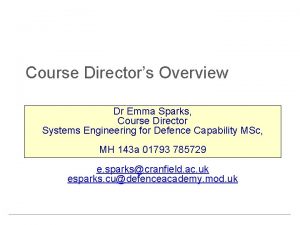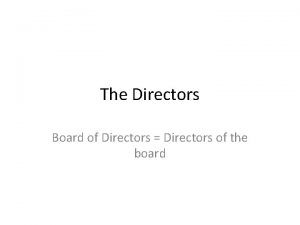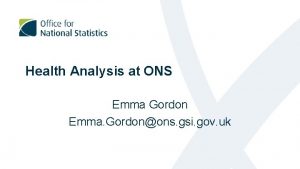Course Directors Overview Dr Emma Sparks Course Director


















- Slides: 18

Course Director’s Overview Dr Emma Sparks, Course Director Systems Engineering for Defence Capability MSc, MH 143 a 01793 785729 e. sparks@cranfield. ac. uk esparks. cu@defenceacademy. mod. uk

Application • Deadline for Applications for September 15 is 31 st July 15. • Students can apply for September as long as sponsorship is in place 6 weeks after start of registration, however, • If sponsorship is not likely to be in place in time the applications can be deferred until January 16 intake.

Application (cont) • All students should use the normal application form not the MOD one • Link to information on applying https: //www. cranfield. ac. uk/studying-atcranfield/how-to-apply/ • Link to application form https: //www. cranfield. ac. uk/studying-atcranfield/how-toapply/20130612_mod_postgraduate_and_sc_a pplication_june_13. pdf

Course summary


Typical FT/PT Full Module Pre-study (20 to 30 hrs) (1 -week full-time or 5 weeks part-time) Taught (~40 hrs) (1 -week full-time & part-time) (can overlap, see timetable) Assessment & Self study (30 hrs) (1 -week full-time or 5 weeks part-time) (may overlap pre study of next module)

Full-time Credits Full-time course runs for 48 weeks A 10 -credit module requires 100 hours of student effort • ~33 hours/week, 3 weeks • Reading week, Taught week, Assignment week Full-time Thesis requires 800 hours of student effort • 9 weeks project block (50+ hours/week!) • 300 hours to be conducted during in taught phase Expect to do 40+ hours/week, more at the end!

Part-time Credits Part-time students register for up to 5 years • Reading and assignment off site. • Taught weeks residential Nominal Four 10 -credit module per year • 4 X 1 -week Residential • Plus average of ~6 hours/week over 40 weeks • (may peak at 12 hours if min module gap chosen) Part-time project requires 800 hours of student effort, e. g. • 15 hours/week for 18 months • 50/50 “think to doing” is probably about right

Registering on Modules • Part time students would normally be expected to take the following modules in their first academic year, but there is flexibility having taken SAE • • • SAE A 7 th – 18 th September 15 LPI B 23 rd -27 th November 15 AST B 22 nd – 26 th February 16 LPA B 9 th - 13 th May 16 Students are expected to select 40 credits normally four modules per academic year minimum. Students should email their module selection to Becky Coker r. coker@cranfield. ac. uk copy to Bronwen b. a. holden@cranfield. ac. uk

Assessment/ Exams • SAE 1. 5 hour Closed Book Exam - (4 th December 2015) (as well as a written assignment) • LPA 3 hour Exam – (1 st February 2016) – Part 1 – knowledge – 1 hour – Closed Book – Part 2 – application – 2 hours – Open Exam (the question will be issued before the exam date (72 hours before). The student will be able to bring into the examination 4 sides of A 4 paper notes. No books will be allowed into the examination. ) Past examination papers are available on-line in the VLE All other modules have a written assignment for completion within five weeks of module completion.

Study Path • • SAE must be taken first and is a pre-requisite for all the other modules. LPI must be taken before LPA. If opting for SEW this must be taken after the completing SAE, LPI, LPA and, AST modules. Students will also normally be expected to take the module examination at the first opportunity during the academic year they attended the modules. The electives can be studied in any order, subject to specific restrictions at the module level. Students will normally be required to complete all taught modules before ASEW. It is strongly recommended that students complete the Thesis Selection Workshop before commencing his/her thesis.

PG Cert - Intended Learning Outcomes Knowledge • Distinguish between systems and complex systems. • Recognize complex systems and their associated problems. • Design cost-effective, timely and effective complex systems. • Defend adopting a systems approach over other methods of solving complex systems problems. • Analyze the principal influences and constraints on the modern defence environment. • Use systems engineering methods to explore defence lifecycle issues. Skills • Apply systems knowledge and systems thinking to the decision making process in relation to systems’ problems in a constantly changing defence environment comprising people, doctrine, technology, time and budget. • Formulate a Systems Engineering approach to Through Life Management Planning, Requirements Engineering, System Design, Trade-offs, Verification, Validation and Integrated Test and Evaluation. • Assemble stakeholder needs and constraints, making appropriate use of requirements management techniques.

PG Dip - Intended Learning Outcomes As for PG Cert plus: Skills • Analyse realistic problems which occur in a constantly changing defence environment (comprising people, doctrine, technology, time and budget) and may be solved using complex decisionmaking processes. • Organise a tailored, whole system, through-life approach to explore a complex problem, using appropriate methods and tools. • Judge the quality of systems engineering practices applied by industry and government in the defence environment. • Propose a practical systems approach to accommodate both industrial and governmental ideology. • Assess risk and uncertainty in complex systems. • Propose suitable resources to mitigate risk and uncertainty in complex systems.

PG Dip - Intended Learning Outcomes Continued: Skills • Construct simple models, using modern techniques, tools and • • • processes such as Synthetic Environments, to facilitate defence acquisition. Appraise Systems Engineering published work to justify and support their line of reasoning. Express effectively, through oral and written communication, their justified line of reasoning. Critically analyse practical situations requiring complex decisionmaking to solve dynamic systems problems involving people, doctrine, technology, time and cost. Organise a balanced, whole system, through life approach and exploit appropriate methods and tools. Critically compare and contrast industrial best practices in SE with defence acquisition and propose how to achieve a practical systems approach.

MSc - Intended Learning Outcomes As for PG Dip plus: Knowledge • Recognise a complex Systems Engineering problem which can be solved using knowledge acquired during the taught phase of the course. • Assess evidence gathered through self-directed research. • Defend the validity of their conclusions in relation to their chosen complex systems engineering problem. Skills • Assemble evidence to support their line of reasoning and conclusions for their chosen complex Systems Engineering problem in conjunction with dependent and independent learning abilities. • Write a thesis to convey their problem, assessment, defence and conclusions associated with their identified complex systems engineering problem.

Virtual Learning Environment (VLE) Material stored, allowing student access on and off campus Course notes and material available as it is delivered. Course admin available in advance Discussion forum.

FEC, Mentors and Supervisors The FEC is responsible for your pastoral welfare and should be the first point of contact for any enquiries or concerns. The FEC will help you plan your path through the course and can assist with: • • • Module registering Request for extensions Request to suspend studies Advising students on who is responsible for what Personal and work related problems which affect you ability to study All students will be appointed an Academic Mentor. • This mentor is responsible for helping you with academic content queries and can assist you with personal matters if you do not wish to speak to the FEC. All students who undertake a Thesis will be appointed a relevant member of the academic staff as a supervisor before they commence their Thesis. • The supervisor and their responsibilities will be explained in the Thesis Selection Workshop

 Emma sparks cranfield
Emma sparks cranfield Directors emma wolverson
Directors emma wolverson Ben eubanks md
Ben eubanks md Sparks family tree
Sparks family tree Economic recovery sparks change
Economic recovery sparks change Religion sparks reform
Religion sparks reform Chapter 8 section 1 religion sparks reform
Chapter 8 section 1 religion sparks reform Wallace community college scholarships
Wallace community college scholarships Chapter 8 section 1 guided reading religion sparks reform
Chapter 8 section 1 guided reading religion sparks reform By discharging electric sparks into a laboratory
By discharging electric sparks into a laboratory Butch sparks
Butch sparks Guten tag ich heiße uta
Guten tag ich heiße uta Emmett sparks
Emmett sparks Chapter 9 section 4 reforming the industrial world
Chapter 9 section 4 reforming the industrial world Religion sparks reform
Religion sparks reform Chapter 8 section 1 religion sparks reform
Chapter 8 section 1 religion sparks reform Felix sparks
Felix sparks Northern nevada adult mental health
Northern nevada adult mental health Arcs and sparks
Arcs and sparks


































